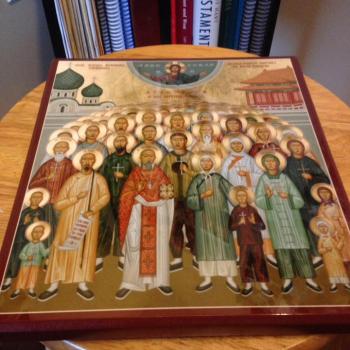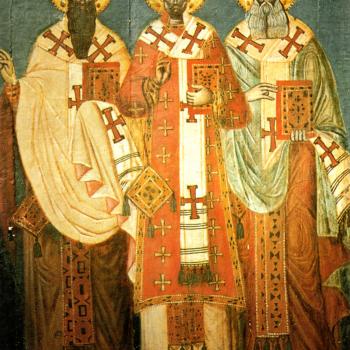One of the major conversation jammers in our public discourse is that political and theological conservatism are often equated.
Most people would find the equation obvious. I mean, wasn’t it a coalition of conservative evangelical Protestants and Roman Catholics that has tried take back America (and other civil societies) for God, the traditional family, and small government since the 1970s? Didn’t evangelicals support the neoconservative Reagan, Bush I, and Bush II Administrations in droves? Aren’t the Tea Party people, with their Glenn Becks and Rush Limbaughs, theological conservatives?
Sure. But this is beginning to change.
Let’s start with Sen. Rob Portman’s (R-Oregon) about-face on same-sex marriage. Portman recently wrote an op-ed in The Columbus Dispatch that he was changing his position on marriage equality because his son came out as gay. Wishing each of his children the happiness he had experienced in his 26-year marriage, he recanted his prior opposition to same-sex marriage and supported it, whatever the political cost might be.
The creditors came immediately. Unsurprisingly, the Traditional Values Coalition fulminated at his reversal, arguing that it was like supporting drunk driving because one’s children are drunk drivers. More interestingly, neo-Reformed figure Pastor John Piper was asked on a special episode of the Desiring God podcast what he thought about a Republican endorsing same-sex marriage. This is interesting because the question (presumably from a neo-Reformed follower of Piper) equates the Republican Party with evangelical Christianity.
Piper responded by pulling apart political and theological conservatism. Portman had said:
I wrestled with how to reconcile my Christian faith with my desire for Will to have the same opportunities to pursue happiness and fulfillment as his brother and sister. Ultimately, it came down to the Bible’s overarching themes of love and compassion and my belief that we are all children of God.
Piper said that both Portman’s definition of happiness and his reading of the Bible’s overarching themes were “self-defined” and a “hermeneutical strategy” that negated the “particulars” of Scripture. He called the op-ed “sad”: “Rob Portman has said that for conservative reasons like the Prime Minister David Cameron, now he’s going to switch his views from supporting traditional man-woman marriage to supporting so-called same-sex marriage. It’s a very sad article.” He also said that this was “tragic,” as Portman’s love for his son wasn’t actually love and compassion because it won’t lead to heaven. In other words (and in less jarring terms), Portman’s reading of the Bible wasn’t as theologically conservative as Piper’s.
Where Piper is right, though, is also where Piper is wrong. Piper thinks that Portman is a tragic conservative figure. But Portman is not tragic. He’s being honest about what his conservatism is about:
British Prime Minister David Cameron has said he supports allowing gay couples to marry because he is a conservative, not in spite of it. I feel the same way. We conservatives believe in personal liberty and minimal government interference in people’s lives. We also consider the family unit to be the fundamental building block of society. We should encourage people to make long-term commitments to each other and build families, so as to foster strong, stable communities and promote personal responsibility.
As The New Yorker points out, this is a courageous act. It’s not tragic because Portman is revealing that you don’t have to be a theological conservative to be a political conservative. In fact, more people might realize that small-government ideologies of protecting private freedoms and de-regulating business are actually excellent arguments for same-sex marriage. (Just ask Ted Olson, the Republican half of the plaintiff team in the Proposition 8 case.) A few might even discover that politically conservative journalist Andrew Sullivan proposed same-sex marriage as a conservative experiment to build families’ economic stability to get people off welfare. (Yes, I know that Sullivan is Catholic and that he claims that his case for same-sex marriage is rooted in his faith. I’m saving that for another post.)
In other words, Piper is right that Portman’s hermeneutic is not theologically conservative. But it doesn’t make Portman tragic. It makes him honest about what political conservatism is about.
Here’s another example. As if intentionally trying to stoke my annoyance with competitive religion, Canada’s conservative newspaper, the National Post, published their version of the recent conclave events. The cardinal of interest? Marc Cardinal Ouellet.
Cardinal Ouellet was one of the papabili who, according to a recent Italian news report, was almost elected, but threw his support behind Jorge Mario Cardinal Bergoglio, now Pope Francis. Ouellet, it is reported, is “doctrinally conservative,” so much so that he has condemned same-sex marriage and abortion even in the case of rape. It would seem like a match made in heaven, then, between Ouellet and political conservatives of the stripes of Todd Akin and Richard Mourdock, or as Montreal newspapers put it at the time, between Ouellet and Islamic fundamentalists (Islamophobia much, though? Awkward).
Conservative as the National Post may be, its portrayal of Ouellet rubs like nails on a chalkboard. The National Post issues a blatantly nationalist and economistic account of what is portrayed as a pro-Canada Ouellet papal candidacy. It speaks of how people back at Ouellet’s home town are disappointed by not having a Canadian pope. It discusses the conclave as a sort of nation-to-nation soccer (or hockey?) competition: Ouellet let the Canadian team down, while the Argentinians were elated. It suggests that Ouellet’s loss is not just symbolic; it’s economic, shattering his home town’s last-ditch effort to bring tourism to their rural area. Ouellet didn’t just let the national team down; he sank the economy too, devastating the business prospects of the traditional families he purports to care about.
If this is conservatism, then Cardinal Ouellet must not be a conservative. Read his very interesting treatise on the family Divine Likeness some time. It comes from a completely different wavelength. While the National Post‘s conservatism revolves around a weird kind of Canadian patriotism and a business reading of papal prospects, Ouellet approaches the world through what Swiss theologian Hans Urs von Balthasar called a katalogical approach. A katalogical approach doesn’t start from social scientific observation of human reality. It starts with God’s cosmic scale and moves down to interpret human social relations. This reveals what theologians call a theological anthropology, a way of understanding humans not by how they see themselves, but by how God sees them. In Divine Likeness, Ouellet applies this approach to the family. What’s conservative about this is that Ouellet is interested in the divine cosmic order at the expense of the social sciences.
Ouellet’s conservatism is not the same as the National Post‘s. He is not interested in an economic or nationalistic argument, as far as the papacy is concerned. In fact, it’d probably make sense to oppose them because they’re the kinds of things that lead to what he once called “secular fundamentalism.” (We can have a conversation about whether this is really what he thinks, based on his comments on Quebecois identity for the Bouchard-Taylor Commission.)
Yesterday, I said that the media really does have a liberal bias, if what you mean by liberalism is an obsession with turning everything into cogs in the free market machine. Today, Rob Portman and Marc Cardinal Ouellet teach us that political conservatism is not theologically conservative at all. It’s good old classical liberalism. It’s the pro-market stump. It sounds oddly similar to the forces of secularization. It’s supposed to be the schpeal that theological conservatives oppose.
Put this way, it means that the conversation shouldn’t really be about how theological and political conservatisms are coming apart. It should be about why they got together in the first place.
In other news: how about a church “of the poor and for the poor“?










